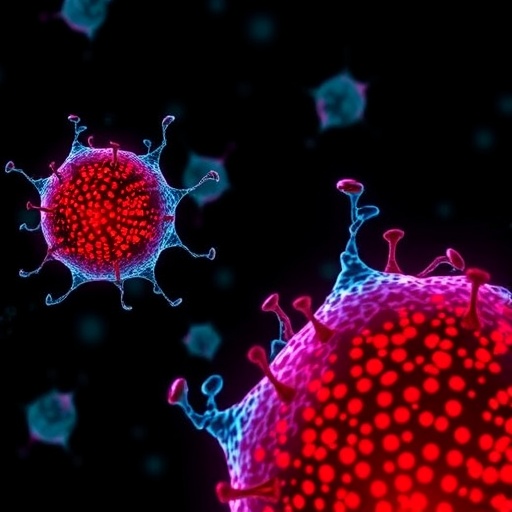In a significant breakthrough in the field of cancer research, a team led by Shukla, Sharma, and Gupta has made strides in the discovery of a novel Bruton’s Tyrosine Kinase (BTK) inhibitor. This groundbreaking work, documented in their recent study published in Molecular Diversity, provides fresh insights into the therapeutic potential of this compound in inducing apoptosis and halting tumor growth by arresting cells in the G1 phase of the cell cycle. The implications of such findings hold promise for enhancing oncological treatment protocols.
Bruton’s Tyrosine Kinase (BTK) is a crucial enzyme involved in various signaling pathways that promote cell survival, particularly in B-cells. Dysregulation of BTK activity has been implicated in several malignancies, including leukemia and lymphoma, where cancer cells exploit these signaling pathways to evade apoptosis and proliferate uncontrollably. In the quest for targeted therapies, inhibiting BTK activity presents a plausible route to mitigating such oncogenic processes.
In this study, the researchers employed a structure-guided discovery approach, utilizing computational methods to identify potential inhibitors that could precisely target BTK. By analyzing the structural configurations of BTK and its interactions with known inhibitors, the team was able to design a novel compound that exhibited a significantly improved binding affinity. This meticulous approach not only enhanced the efficacy of the inhibitor but also reduced off-target effects typically associated with traditional chemotherapeutic agents.
The study demonstrated that the newly identified BTK inhibitor could effectively induce apoptosis in various tumor cell lines. In vitro experiments showed that treatment with this compound led to a significant increase in cellular apoptosis, characterized by the activation of caspases and subsequent degradation of cellular components. The researchers elucidated the mechanism behind this induction of cell death, highlighting the pivotal role of BTK inhibition in triggering apoptotic pathways that would otherwise remain dormant in cancerous cells.
In addition to inducing apoptosis, the novel inhibitor was found to cause a pronounced arrest in the G1 phase of the cell cycle. This G1 phase arrest is particularly relevant as it serves as a critical checkpoint where cells assess their readiness to replicate DNA and proliferate. By halting cells in this phase, the inhibitor effectively staves off uncontrolled growth and promotes a return to normalcy within the tissue microenvironment, offering a compelling strategy for managing aggressive tumors that contribute to high mortality rates.
The impact of this BTK inhibitor extends beyond mere tumor inhibition; it encapsulates the broader implications of targeted therapies in oncology. Traditional chemotherapeutic treatments often lead to systemic toxicity and resistance, undermining their efficacy. However, this novel inhibitor stands out due to its specificity and potential for minimal collateral damage to healthy cells. As highlighted by the researchers, the clinical translation of such targeted strategies could revolutionize cancer treatment, offering patients not only prolonged survival but also improved quality of life.
The anticipated pathway for clinical development involves rigorous testing phases, including further in vitro studies followed by in vivo assessments in animal models. Preclinical evaluations will likely focus on understanding the pharmacokinetics and pharmacodynamics of the compound, ensuring that it maintains effective concentrations in living organisms without eliciting severe adverse effects. Such thorough investigations are critical in establishing dosage regimens and predicting potential interactions when used alongside existing chemotherapy agents.
Furthermore, ongoing research efforts are directed towards optimizing the chemical structure of the BTK inhibitor. The aim is to enhance properties such as solubility, stability, and absorption while minimizing toxicity. This iterative process is fundamental in drug development as it ensures that the lead candidate possesses the necessary attributes to transition from the laboratory bench to clinical application seamlessly.
As the oncology landscape evolves, the integration of personalized medicine plays a pivotal role in tailoring treatments to individual patient profiles. The identification of biomarkers associated with BTK signaling pathways could facilitate the selection of patients who would benefit most from this novel inhibitor. The researchers emphasize that a biomarker-driven approach could maximize therapeutic outcomes while minimizing unnecessary exposure for those unlikely to respond.
In conclusion, the study conducted by Shukla et al. epitomizes a promising direction in cancer therapy, illustrating the significance of targeted approaches in combatting the multifaceted challenges posed by malignancies. The novel BTK inhibitor not only demonstrates compelling efficacy in inducing apoptosis and disrupting the cell cycle of tumor cells, but it also highlights the ongoing evolution of cancer treatment paradigms. The future will undoubtedly rely on breakthroughs such as this to usher in effective, safe, and patient-centered oncology therapies.
The journey of this research is far from over, and as the scientific community eagerly monitors the developments surrounding this BTK inhibitor, there is a palpable sense of hope that such innovations will pave the way for enhanced treatment modalities in the fight against cancer. The collaborative efforts of researchers, clinicians, and industry partners are crucial in bringing these findings to fruition, ultimately aiming to reduce the global burden of cancer and improve patient outcomes worldwide.
As this narrative unfolds, ongoing discourse within the scientific community will undoubtedly address the broader implications of such discoveries, fostering an environment where innovation thrives, and patient care is continuously enhanced.
Subject of Research: Development of a novel BTK inhibitor targeting apoptosis and G1 phase arrest in tumor cells.
Article Title: Structure-guided discovery of a novel BTK inhibitor inducing apoptosis and G1 phase arrest in tumor cells.
Article References:
Shukla, A., Sharma, A., Gupta, S. et al. Structure-guided discovery of a novel BTK inhibitor inducing apoptosis and G1 phase arrest in tumor cells.
Mol Divers (2025). https://doi.org/10.1007/s11030-025-11334-z
Image Credits: AI Generated
DOI:
Keywords: BTK inhibitor, apoptosis, tumor cells, G1 phase arrest, cancer research, molecular diversity, targeted therapy.




